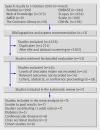Chocolate consumption and cardiometabolic disorders: systematic review and meta-analysis
- PMID: 21875885
- PMCID: PMC3163382
- DOI: 10.1136/bmj.d4488
Chocolate consumption and cardiometabolic disorders: systematic review and meta-analysis
Abstract
Objective: To evaluate the association of chocolate consumption with the risk of developing cardiometabolic disorders.
Design: Systematic review and meta-analysis of randomised controlled trials and observational studies.
Data sources: Medline, Embase, Cochrane Library, PubMed, CINAHL, IPA, Web of Science, Scopus, Pascal, reference lists of relevant studies to October 2010, and email contact with authors.
Study selection: Randomised trials and cohort, case-control, and cross sectional studies carried out in human adults, in which the association between chocolate consumption and the risk of outcomes related to cardiometabolic disorders were reported.
Data extraction: Data were extracted by two independent investigators, and a consensus was reached with the involvement of a third. The primary outcome was cardiometabolic disorders, including cardiovascular disease (coronary heart disease and stroke), diabetes, and metabolic syndrome. A meta-analysis assessed the risk of developing cardiometabolic disorders by comparing the highest and lowest level of chocolate consumption.
Results: From 4576 references seven studies met the inclusion criteria (including 114,009 participants). None of the studies was a randomised trial, six were cohort studies, and one a cross sectional study. Large variation was observed between these seven studies for measurement of chocolate consumption, methods, and outcomes evaluated. Five of the seven studies reported a beneficial association between higher levels of chocolate consumption and the risk of cardiometabolic disorders. The highest levels of chocolate consumption were associated with a 37% reduction in cardiovascular disease (relative risk 0.63 (95% confidence interval 0.44 to 0.90)) and a 29% reduction in stroke compared with the lowest levels.
Conclusions: Based on observational evidence, levels of chocolate consumption seem to be associated with a substantial reduction in the risk of cardiometabolic disorders. Further experimental studies are required to confirm a potentially beneficial effect of chocolate consumption.
Conflict of interest statement
Competing interests: All authors have completed the ICMJE uniform disclosure form at
Figures
Comment in
-
The temptations of chocolate.BMJ. 2011 Sep 20;343:d5883. doi: 10.1136/bmj.d5883. BMJ. 2011. PMID: 21933827 No abstract available.
-
Observational studies find association between chocolate consumption and reduced risk of cardiovascular disease and diabetes.Evid Based Med. 2012 Aug;17(4):128-9. doi: 10.1136/ebmed.2011.100310. Epub 2011 Nov 15. Evid Based Med. 2012. PMID: 22087008 No abstract available.
-
Hoher Schokoladenkonsum reduziert das Risiko kardiovaskulärer Störungen.Praxis (Bern 1994). 2011 Dec 14;100(25):1559-60. doi: 10.1024/1661-8157/a000757. Praxis (Bern 1994). 2011. PMID: 22161885 German. No abstract available.
References
-
- American Heart Association. Heart disease and stroke statistics 2010 update: a report from the American Heart Association. Circulation 2010;121:e46-215. - PubMed
-
- World Health Organization. Cardiovascular diseases. Fact sheet No 317. 2011. www.who.int/mediacentre/factsheets/fs317/fr/index.html.
-
- World Health Organization. 2008-2013 action plan for the global strategy for the prevention and control of non-communicable diseases. 2000. http://whqlibdoc.who.int/publications/2009/9789241597418_eng.pdf.
-
- Corti R, Flammer AJ, Hollenberg NK, Luscher TF. Cocoa and cardiovascular health. Circulation 2009;119:1433-42. - PubMed
Publication types
MeSH terms
Grants and funding
LinkOut - more resources
Full Text Sources
Medical
Miscellaneous


